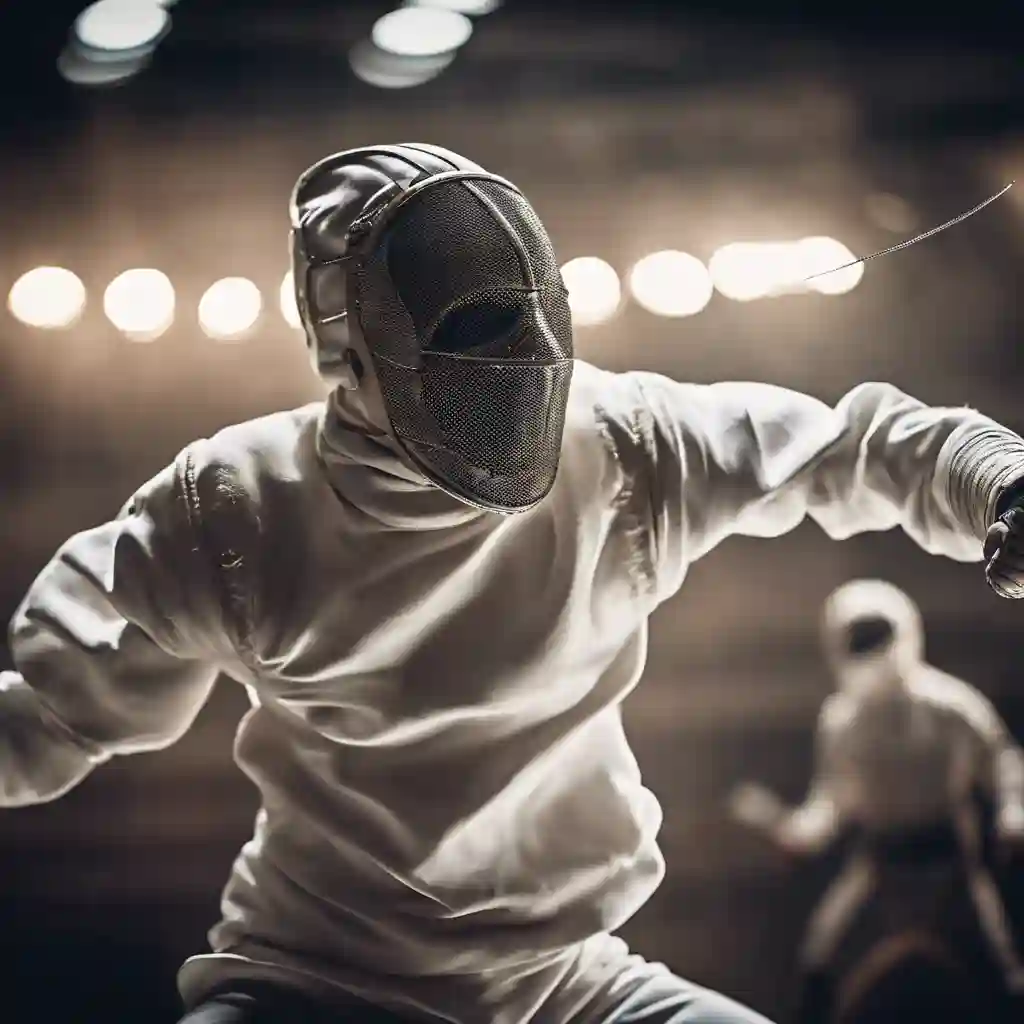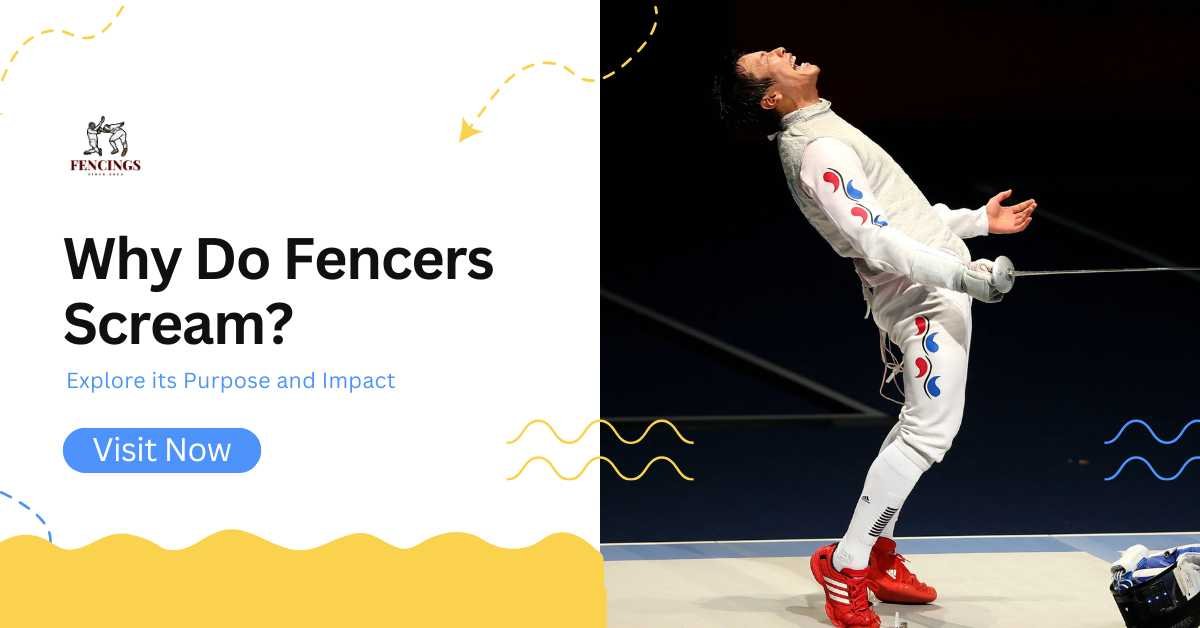Fencing, a historical and fashionable game, is frequently characterised by its rapid movements, strategic manoeuvres, and, extraordinarily, the wonderful sounds of fencers shouting as they engage in struggle. If you’ve ever watched Fencing Healthy, you would have questioned Why Do Fencers Scream?
Fencing is regularly described as a dance—a sleek interplay of motion, technique, and ability. The game has a rich history, dating back to medieval times when it became the simplest way of combat and a form of art.
Modern fencing has evolved into an aggressive recreation that consists of 3 major weapons: the foil, epee, and sabre. Each weapon has its particular regulations and techniques. However, one issue remains steady across all sorts of fencing: the unmistakable sounds made by the fencers.
This captivating question opens the door to information on the sport at a deeper level, exploring the physical, emotional, and strategic reasons behind these vocalizations.
The Basics of Fencing
Before we answer the question of why fencers scream, let’s take a second to understand the sport itself. Fencing is a combat game that involves warring parties who compete using swords. There are three primary forms of weapons used in fencing: the foil, épée, and sabre. Each weapon has its own policies and target regions, making fencing a completely unique aggregate of strategy, agility, and skill.
The Elements of Fencing
- Technique: Fencers ought to master various techniques, along with footwork, blade paintings, and timing.
- Speed: Quick reflexes and the capability to react rapidly are critical for success.
- Strategy: Understanding your opponent’s movements and developing a sport plan is vital.
- Mental Focus: Fencers want sturdy concentration to maintain an area all through suits.
Now that we understand the basics of fencing, we can answer the exciting question: Why do fencers scream?
The Reasons Behind the Fencing Scream
1. Psychological Release
One of the number one reasons fencers scream is to release pent-up power and anxiety. Fencing is an excessive recreation that requires an excessive level of attention. The act of screaming can serve as a manner to alleviate pressure and channel adrenaline.
- Emotional Expression: Just like athletes in other sports, fencers use their voices to express feelings. A scream can represent excitement, frustration, or determination.
- Boosting Morale: The sound of a scream can uplift a fencer’s morale, each for themselves and their teammates. It creates an atmosphere of strength and enthusiasm.
2. Intimidation Tactics
Fencers frequently shout during suits to intimidate their opponents. A loud scream can disrupt an opponent’s awareness and create a mental effect.
- Mind Games: In competitive sports, the intellectual aspect is just as important as the physical aspect. By screaming, a fencer can assert dominance and confidence, probably throwing their opponent off balance.
- Creating a Presence: A well-timed scream can make a fencer seem more formidable and effective, instilling doubt in their opponent’s mind.
3. Enhancing Performance
Fencers might scream to enhance their performance in the course of about. This vocalization can serve as a cue to cognizance and unleash their electricity.
- Timing and Rhythm: Shouting can help set a rhythm in a fencer’s movements, allowing them to coordinate their attacks and defences more efficaciously.
- Powering Through Moves: A scream can supply a fencer with the extra burst of energy needed to execute a powerful assault or protecting manoeuvre.
4. Cultural Aspect of Fencing
Fencing has a wealthy history and way of life that includes vocalization at some point in fit. The sound of a fencer’s scream may be part of the sport’s identification.
- Tradition and Ritual: Just as a few athletes have pre-game rituals, fencers may also have their very own traditions that include vocal expressions. This communal element provides the atmosphere of the game.
- Shared Experience: Hearing fellow fencers scream can create a sense of camaraderie and connection in the competition. It fosters a shared enjoyment that enhances the community spirit of fencing.
Poetic Reflection:
In the heat of the duel, wherein blades clash and fly, A fencer’s fierce scream pierces the air and the sky. With each cry of passion, they summon their may, In the dance of the duel, they find both their combat.
The Science Behind the Scream1. Adrenaline and Performance
When fencers scream, they regularly revel in a surge of adrenaline. This hormone enhances overall physical performance through the growth of coronary heart price, energy, and strength degrees.
- Fight or Flight Response: The body’s herbal response to pressure can kick in at some stage in a match, main to heightened alertness and readiness.
- Endorphins: Screaming can also release endorphins, developing a sense of euphoria that can enhance performance.
2. Vocalization and Breathing
Screaming can help alter breathing, which is crucial in fencing. Controlled respiration allows for higher oxygenation and stamina.
- Breath Control: Fencers can control their breath by shouting, making it simpler to preserve stamina during a match.
- Focus on Exhalation: Vocalizing throughout movement encourages proper exhalation, which could assist in manipulating strain and maintaining attention.
👉Related Post: Fencing Tips for Beginners: Unleashing Your Inner Warrior
Top 5 Frequently Asked Questions About Fencing Screams
1. Why Do Fencers Actually Scream During Matches?
Comprehensive Vocalization Breakdown:
Scream purposes:
- Release physical tension
- Psychological intimidation
- Concentration enhancement
- Energy redirection
- Emotional expression
- Competitive signalling
- Momentum Generation
2. Is Screaming a Legitimate Competitive Strategy?
Strategic Vocalization Analysis:
- Scientifically proven technique
- Endorsed by sports psychologists
- Increases adrenaline production
- Disrupts opponent’s concentration
- Demonstrates competitive intensity
- Culturally accepted practice
- Regulated by competition rules
3. What Psychological Benefits Exist?
Mental Performance Advantages:
- Stress reduction
- Increased focus
- Adrenaline release
- Confidence boost
- Emotional regulation
- Performance enhancement
- Competitive mindset activation
4. Are There Different Types of Fencing Screams?
Vocalization Typology:
- Aggressive screams
- Controlled exhales
- Rhythmic vocalizations
- Tactical yells
- Emotional releases
- Strategic sound bursts
- Precision-focused sounds
5. How Do Professional Fencers Train Vocalization?
Vocalization Training Strategies:
- Breathing techniques
- Psychological conditioning
- Sound control exercises
- Emotional management
- Performance visualization
- Stress reduction practices
- Competitive mindset development
The Physiological Science of Screaming
Biological Mechanisms
- Neurological Triggers
- Adrenaline release
- Cortisol management
- Nervous system activation
- Stress response modulation
- Performance hormone production
- Muscular Response
- Tension release
- Energy redirection
- Muscle activation
- Coordination enhancement
- Physical performance optimization
Psychological Dimensions of Fencing Screams
Emotional Expression
- Competitive Psychology
- Emotional regulation
- Psychological warfare
- Confidence projection
- Intimidation techniques
- Mental resilience
- Performance Mindset
- Focus enhancement
- Stress management
- Competitive identity
- Emotional control
- Mental preparation
Cultural and Historical Context
Vocalization in Combat Sports
- Historical Precedents
- Martial arts traditions
- Cultural combat expressions
- Psychological warfare
- Ritualistic communication
- Competitive signalling
- Global Variations
- Different cultural approaches
- Unique vocalization styles
- Regional competitive traditions
- Psychological adaptation
- Competitive communication
Training and Technique Development
Vocalization Skill Building
- Professional Strategies
- Controlled breathing
- Sound modulation
- Emotional management
- Performance visualization
- Psychological conditioning
- Practice Techniques
- Breathing exercises
- Vocalization drills
- Emotional regulation
- Performance simulation
- Competitive mindset training
Ethical and Competitive Considerations
Regulatory Perspectives
- Competition Rules
- Acceptable vocalization
- Behavioural guidelines
- Psychological warfare limits
- Sportsmanship standards
- Competitive integrity
- Psychological Boundaries
- Emotional control
- Respectful competition
- Mental health considerations
- Performance ethics
- Competitive balance
Types of Screams in Fencing

Not all screams are created equal. The art of screaming in fencing includes many styles, each with its personal tone, timbre, and intensity.
- The Victory “Shout”
A short but loud exclamation made after landing a hit—that is the maximum, not unusual scream you’ll hear for the duration of fits.
- The Long Yell
Prolonged and resonant, this scream is regularly reserved for moments of superb attempt or close competition.
- The Strategic “Growl”
Some fencers use a low, guttural sound to distract combatants in the course of bouts, relying more on mental manipulation than outright extent.
Each scream displays the fencer’s private fashion and strategic mindset, adding a detail of individuality to the bout.
Statistical Insights
Understanding the prevalence and impact of screaming in fencing includes looking at statistics and studies.
- Performance Improvement: Studies have shown that athletes who vocalize all through exertion can enhance their performance by using up to 10% in phrases of force and energy output. (Source: Journal of Sports Sciences)
- Psychological Impact: Surveys indicate that 60% of fencers accept as true that screaming gives them a mental benefit over their combatants. (Source: International Fencing Federation Survey)
- Referee Decisions: Analysis of fencing fits revealed that vocal reactions can have an effect on referee selections in near calls about 15% of the time. (Source: Sports Psychology Journal)
- Cultural Variations: Fencers from nations with robust martial arts traditions are 30% more likely to comprise screaming into their fencing fashion. (Source: Cultural Sports Studies)
These data help explain why fencers scream and how it affects the game to a couple of degrees.
How Does the Sports World View Screaming in Fencing?
Fencing’s use of screaming has sparked debates in the wearing network. Some recognize the raw emotional electricity behind it, while others criticize it as immoderate or unsportsmanlike.
Despite occasional complaints, screaming is widely known with the aid of maximum within the fencing world as part of the sport’s lifestyle. Whether the screams energize audiences or spark a referee’s interest, their effect on the dynamics of fencing in shape is simple.
Other sports fanatics have additionally started to observe the similarities between fencing’s screaming culture and comparable vocal practices in athletics, paving the way for more knowledge and appreciation.
Conclusion: The Voice of Competitive Spirit
Why do fencers scream? It’s a symphony of human emotion, a primal expression of competitive passion transcending mere sound.
Every scream is a story; every yell is a battle cry.
Final Reflection
Fencing isn’t just a sport. It’s a conversation between body, mind, and spirit—where every sound speaks volumes.
What will your voice reveal on the competitive stage?

